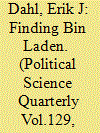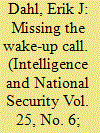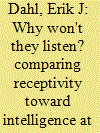| Srl | Item |
| 1 |
ID:
133219


|
|
|
|
|
| Publication |
2014.
|
| Summary/Abstract |
MUCH OF THE DISCUSSION ABOUT THE HUNT FOR and killing of Osama bin Laden has focused on the remarkable abilities of the U.S. Special Operations Forces who carried out the raid. Accounts by journalists and others revealed more than was previously known about the Navy SEALs who were involved, and sparked complaints by critics that the Barack Obama administration had leaked sensitive information in order to portray its own actions in a positive light.1 Terrorism experts have debated whether the killing would weaken al Qaeda, and what it would mean for the future of international terrorism.2 And other scholars and analysts have considered what the story of bin Laden's death reveals about American national security and foreign policy decision making. Graham Allison, for example, writes that "this case demonstrates that the U.S. government is capable of extraordinary performance in extraordinary circumstances.
|
|
|
|
|
|
|
|
|
|
|
|
|
|
|
|
| 2 |
ID:
153076


|
|
|
|
|
| Summary/Abstract |
Since the 9/11 attacks critics of the American intelligence community have often complained about the lack of scientific rigor in intelligence analysis, and much of the work of the intelligence community has been described as mere ‘analysis by anecdote.’ In response, the intelligence community has made a considerable effort to increase the rigor of its analysis. But surprisingly little has been done to examine how intelligence professionals might benefit from adopting one of the most common methods used in the social sciences: case study analysis. This article argues that a greater understanding of how case studies are used by political scientists and other scholars can help improve the quality of intelligence analysis and help the intelligence community assist policymakers as they attempt to understand the threats and challenges of today’s world.
|
|
|
|
|
|
|
|
|
|
|
|
|
|
|
|
| 3 |
ID:
179144


|
|
|
|
|
| Summary/Abstract |
Intelligence has been historically seen as a national-level function, carried out primarily by the federal government. Although local law enforcement agencies have often conducted intelligence activities, these have usually focused on criminal prosecution, leaving to the national level the task of using intelligence to proactively counter national security threats. The U.S. Intelligence Community, for an example, is an exclusively federal-level entity, and the literature on American intelligence tends to focus on national-level organizations such as the Central Intelligence Agency and the Office of the Director of National Intelligence.1 Since the 11 September 2001 (9/11) attacks, however, there has been significant effort in the United States to share intelligence with state and local officials, and to a lesser extent, to create new local intelligence structures and organizations. This has resulted in what might be called the “localization of intelligence,”2 and although civil liberties advocates worry about the possible erosion of liberty and privacy that such efforts may produce, many scholars and law enforcement experts argue that this increased focus on local intelligence has been a positive development. Little research has been done, however, to examine the results of such local intelligence programs.
|
|
|
|
|
|
|
|
|
|
|
|
|
|
|
|
| 4 |
ID:
100933


|
|
|
|
|
| Publication |
2010.
|
| Summary/Abstract |
After major intelligence failures it is often asked why intelligence and security officials failed to heed the many 'wake-up calls' that had been provided by earlier failures and surprises. This article addresses this question by examining intelligence failures as 'focusing events', which is a concept used in the literature on government policy making to explain how disasters and crises can stimulate policy change and help organizations and decision-makers learn. It argues that in order for an intelligence failure such as a major terrorist attack to inspire improved intelligence performance - to be a true wake-up call - that failure must not only act as a focusing event to bring more attention to the threat, but it must also lead to increased intelligence collection and greater receptivity toward intelligence on the part of decision-makers.
|
|
|
|
|
|
|
|
|
|
|
|
|
|
|
|
| 5 |
ID:
060923


|
|
|
| 6 |
ID:
118369


|
|
|
|
|
| Publication |
2013.
|
| Summary/Abstract |
After surprise attacks and other intelligence failures, the complaint is often heard that if only decision-makers had listened more closely to the warnings they had received, disaster might have been avoided. But even though it is generally agreed that intelligence is of little use unless it is received and understood by policymakers, we actually know little about why some leaders are receptive toward intelligence, while others are not. This article argues that the willingness of decision-makers to listen to intelligence depends primarily on two factors: their belief in the seriousness of the issue or threat involved, and their trust in the utility of intelligence. It examines contrasting receptivity toward intelligence in the cases of Pearl Harbor and the Battle of Midway, and suggests that our current models of intelligence-policy relations need to be revised.
|
|
|
|
|
|
|
|
|
|
|
|
|
|
|
|